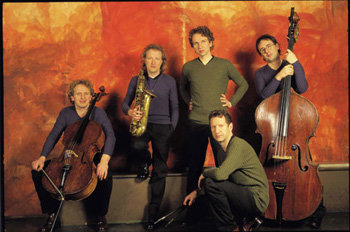Dedicated to Our Sorrowful Hero, Sohn Kee-chung
Dedicated to Our Sorrowful Hero, Sohn Kee-chung
Posted May. 25, 2005 03:40,

Kind and diligent Koreans, fantastic kimchi, wait for us, well be there soon!
Cheerful anticipation bubbled up in the email sent by the five musicians that form the German jazz ensemble Saltacello. The group made their love of Korea clear by releasing 42.195 Great Son, an album dedicated to the memory of Sohn Kee-chung, last March. On June 19 at 7:30 p.m., they will perform their fifth concert in Korea at the main hall of the Sejong Center for the Performing Artsa show dedicated to the eponymous Korean marathoner.
Since adapting such Korean melodies as Ongheya and The Wanderers Sorrow in their second album (Second Flush, 2000), Saltacello has enjoyed continued devotion from both Korean and German jazz fans.
Dong-A: How did you come to love Korean melodies so much?
Peter Schindler (keyboard, leader): All five of us live in Stuttgart. We mainly used Latin melodies in our first album, but one day we were invited to a party given by a Korean person and discovered Koreas distinctive melodies and excellent cuisine. After that, we began exhaustively looking up everything about Korea.
Dong-A: What is it that you find impressive about Korean music?
Peter Lehel (saxophone): Theres plenty of swing in Korean music, and spaces for improvisation at every turn. In this respect, it closely resembles jazz.
Dong-A: Introducing Korean music into jazz cant have been an easy experiment
Peter Schindler: I proposed the idea, and it took five seconds for the others to agree after listening to the music.
Dong-A: How did you come to know about the life of marathoner Sohn Kee-chung?
Peter Schindler: We habitually looked up all things Korean on the internet whenever we had time, and one day we came across something on Sohn written by a German journalist. We then looked up a video record of the Berlin Olympics. We were moved by the sight of the sorrowful-looking marathoner as he stood to receive his medal, trying desperately to hide the Japanese flag at his breast. We realized that behind the diligent and optimistic Koreans, there was a painful history.
Dong-A: I heard that all five members are great fans of Korean food.
Markus Faller (drums): Mini Schulz (the bassist) and I in particular are mad about kimchi. We visit a Korean grocery store from time to timenot to buy kimchi, but to buy the ingredients to make kimchi ourselves! Other team members sometimes eat kimchi on bread, but we enjoy the pure taste of kimchi by itself.
Dong-A: Do you have a favorite Korean musician or instrument?
Wolfgang Schindler (cello): We were all deeply moved by the plaintive tones of the haegeum (a traditional string instrument). Among the musicians we performed with, we meshed especially well with the haegeumist Kang Eun-il.
Their upcoming Korean show will feature songs from their new album, including original compositions Great Sohn and Dynamic Korea, and traditional tunes Milyang Arirang, Gang Gang Sullae, and Ongheya.
Yoon-Jong Yoo gustav@donga.com





![취권하는 중국 로봇, ‘쇼’인 줄 알았더니 ‘데이터 스펀지’였다?[딥다이브]](https://dimg.donga.com/c/138/175/90/1/wps/NEWS/IMAGE/2026/02/20/133391101.1.png)

